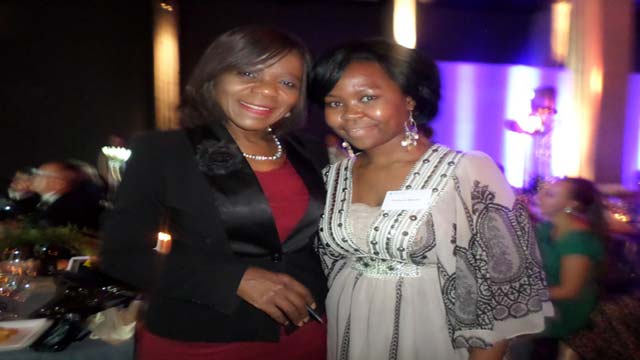
Describing herself as “water-centric” and a “bio-entrepreneur” Ms Prudence Mambo believes in the potential of African-based researchers to contribute to the field of sustainable development and resource management, having been exposed to the realities of a lack of basic services, among which water and sanitation feature prominently.
Ms Mambo is a resident in Celeste House in Drostdy Hall. She is currently a doctoral candidate and holds among others, a Postgraduate Certificate in Education and a Masters in Environmental Biotechnology from Rhodes University. The focus of her MSc, biological remediation of acid mine drainage, informed her interest in the Integrated Algal Ponding System (IAPS) which stemmed from her interest in the biological remediation of waste water.
Ms Mambo was recently chosen as one of South Africa’s 2014 Brightest Young Minds (BYM) at a summit that brought together 100 of the most competitive delegates from over 600 nominations and applications received by the BYM committee, ranging in age from 21-32.
The delegates were mentored and conducted inspirational dialogues with South Africa’s top achieving CEO’s where they were offered advice on how best to navigate between making a profit and maintaining ones morals and values for the benefit of humanity. Networks and databases are currently being generated and consolidated for use by all the participants of the summit this year.
The young delegates were placed in groups and requested to tackle various problems currently facing South Africa. Ms Mambo’s group placed second overall. However, it is the only project identified for further development by Barclays, due to its simple and practical approach.
“I was able to finally meet and converse with South Africa’s Public Protector Thuli Madonsela whom I hold in high esteem. She gave me great advice regarding how I should conduct myself in service and for the betterment of all. It was an inspiring few days and I hope to stay in touch with everyone I met,” said Ms Mambo.
She believes working in the South African water sector, which she describes as dynamic, will afford her the opportunity to participate in and contribute to exploring innovative and sustainable solutions to avert a water crisis in the country. “I believe this sector will provide consistent intellectual stimulation and the opportunity to directly integrate indigenous knowledge and/or needs with current technological advancements while fostering self-reliance,” she said.
“Initially I was very interested in industrially generated waste water, however, over time and through reading I realized that there was insufficient remediation of domestic waste water in South Africa and Africa as a whole and though many varsities were looking into amending this, there was not much of a voice for biological technologies that could be community run,” she explained.
By combining an anaerobic digester with an aerated system the IAPS treats water and acts as a final polishing step prior to the discharge of effluent into the environment, providing an essentially clean biologically generated water stream. Also, being conceptually advanced yet simple in implementation, the IAPS could be run by laymen. “This opens up a number of possibilities including the generation of biomass and power. I realised through reading that communities could be trained to remediate their own wastewater thereby decentralising their waste water remediation needs while mitigating preventable diseases and ensuring a consistent supply of water for irrigation and, after minor modifications to the system as it stands, energy generation and water for household activities. I believe in science with a conscience, science that can address the immediate needs of the people to ensure standard of living and lifestyles improve for all over time.”
Ms Mambo was selected to participate in an Advanced Academic Research Institute workshop in June 2013 at Brown University in Providence, Rhode Island, America. The Brown International Advanced Research Institute is a faculty development initiative that brings promising young scholars from developing countries together with leading researchers in their fields for mentorship opportunities and intensive workshops. For Ms Mambo, the event gave her the opportunity to immerse herself in cutting edge research and glean as much information from the experts.
My supervisor Prof Keith Cowan (Head of Department) has been spearheading this technology and has thus far secured funding (R 18 million) for the commercial scale deployment of this system specifically for the treatment of domestic waste water in the Chris Hani district. The system will hopefully be operational towards the end of next year.
This is a malleable system that can be adapted to suit the environment and specific needs of the community within which it is deployed, therefore each system will be unique in design, configuration and with regard to the products that each system will generate.
“I hope in this lifetime to help give everyone access to clean water and sanitation, which I believe could have been resolved long ago and would have solved a lot of problems such as detrimental effects on the national economy. I genuinely believe that the only thing that can stop you from accomplishing whatever you set your mind to is yourself, and that the only thing that would stop me from achieving my goals are the limits of my own imagination,” she said.
